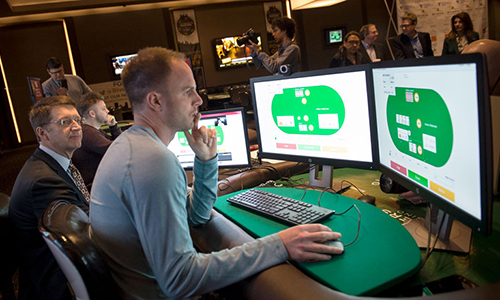U of Alberta’s DeepStack Bot Tops Pros in HUNL Poker Contest
Score another victory for artificial intelligence in the game of poker, after the publication in Science Journal of a convincing win for a University of Alberta AI in a series of heads-up no-limit (HUNL) poker matches against 11 different top HUNL players. The program, which would generally be described as a “bot” in online-poker lingo, scored mathematically significant victories over 10 of the 11 human foes it faced, while reaching a virtual draw with the 11th player.
The program, called DeepStack, comes from the same team of U of Alberta researchers who made news back in 2015 with a program called Cepheus. Back then, the researchers from the school’s Computer Poker Research Group declared one of the simpliest forms of poker — heads-up fixed-limit Texas hold’em — as being “essentially solved” by the Cepheus code.
In the series of matchups, which were conducted back in December, Deepstack was pitted against 33 different HUNL pros who were. The 33 players were from 17 different countries and were recruited for the project via the International Federation of Poker. Cash prizes of up to $10,000 were offered to the top three human finishers as an incentive for participation.
Each of the players was asked to play 3,000 hands each against the bot. Of the 33 pros, 11 played out the full 3,000 hands, thus producing the statistically significant results. The DeepStack program played an additional 14,000-plus hands against another 22 players, resulting in a total of 44,852 hands played. The sample size against the other 22 players was too small for reliable individual analysis, but collectively was in line with the other results.
Those breakthroughs by Cepheus and an earlier U of Alberta bot, Polaris, formalized knowledge that’s been well known in the online-poker world for years: Unfortunately, a well-programmed bot is already more than capable of holding its own against typical players in a limit hold’em format, and in a few years, will likely be capable of the same in many no-limit variants as well.
The win by DeepStack, though, represents a “paradigm shift,” according to its creators, because it’s a demonstration of excellence at no-limit rather than fixed-limit poker. While it’s true that full-table solutions for no-limit hold’em represent yet another layer of complexity that poker AIs have yet to master, the betting line is that it’s only a matter of time. The win by DeepStack also follows a similar newsmaking result involving poker AI. Just a few weeks ago, a program called Libratus topped four professional HUNL players with relative ease.
DeepStack’s success come from additional breakthroughs in adapting to situations involving imperfect information, the crux of poker’s challenge. According to Michael Bowling, lead writer for the U of A team’s publication, “A common feature of [most] games is that players have perfect information. Poker is the quintessential game of imperfect information, and a longstanding challenge problem in artificial intelligence.”
“DeepStack represents a paradigm shift in approximating solutions to large, sequential imperfect information games,” Bowling added. “With many real world problems involving information asymmetry, DeepStack also has implications for seeing powerful AI applied more in settings that do not fit the perfect information assumption.”
The 33 players who participated in the study and played against DeepStack included Juergen Bachman, Alexander Bös, Pol Dmit, Eyal Eshkar, Gaia Freire, Fintan Gavin, Sergey Indonek, Jefri Islam, Phil Laak, Dmitry Lesnoy, Luca Moschitta, Igor Naumenko, Dara O’Kearney, Antonio Parlavecchio, Juan Manuel Pastor, Mike Phan, Silvio Pizzarello, Youwei Qin, Victor Santos, Lucas Schaumann, Sebastian Schwab, Muskan Sethi, Ivan Shabalin, Roman Shaposhnikov, Prakshat Shrimankar, Martin Sturc, Fan Sun, Kaishi Sun, Tsuneaki Takeda, Giedrius Talaka, Stas Tishekvich, Stanislav Voloshin, and Shai Zurr.
Of those, Martin Sturc was the pro who played the full 3,000 hands against DeepStack, presumably winning the $10,000 top prize.





















COMMENTS